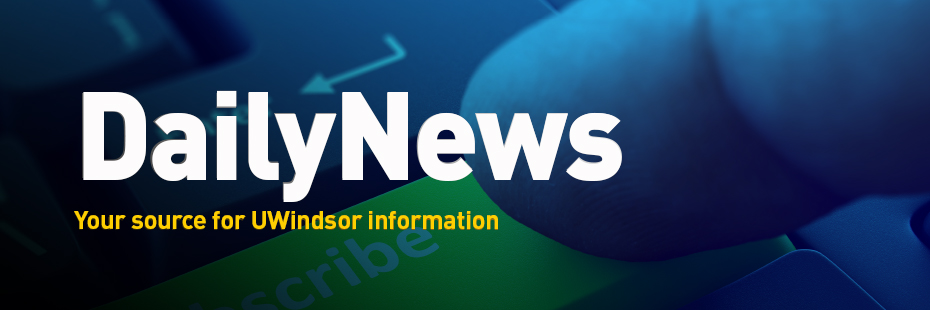 Students in the editing and publishing practicum course take delivery from the printer of books they helped produce: (from left) Michela Lepera, Francesca Johnston, and Ryan McLaughlin.
Students in the editing and publishing practicum course take delivery from the printer of books they helped produce: (from left) Michela Lepera, Francesca Johnston, and Ryan McLaughlin.
Before she joined classmates in the editing and publishing practicum course to produce a book of poems and photos celebrating Windsor, she didn’t really know the city, says Evangeline Yetman.
“Windsor was just the place I lived in, where my friends were,” she says. “I never expected to discover how many beautiful spots there are, how many fond memories people have, or how strong the community is here.”
 And the river, too features photos by Marty Gervais and poems by Kim Fahner, Peter Hrastovec, John B. Lee, Micheline Mayor, and Teajai Travis. It is published by Black Moss Press as part of its South Shore series and will enjoy an official launch Thursday, April 3.
And the river, too features photos by Marty Gervais and poems by Kim Fahner, Peter Hrastovec, John B. Lee, Micheline Mayor, and Teajai Travis. It is published by Black Moss Press as part of its South Shore series and will enjoy an official launch Thursday, April 3.
The practicum is a two-semester course that engages students in everything from dealing with contributors to designing the book cover and interiors, under the guidance of professor Andre Narbonne.
Yetman, an English major responsible for managing public relations on the project, says the experience taught her the importance of communication.
“It’s something that’s overlooked but is such a valuable skill for whatever line of work you are going into,” she says. “I came into this class nervous to have a conversation with established authors or with the press. Now I confidently communicate with them and clearly convey our ideas and decisions.”
Hrastovec (BA 1979, LLB 1982) is a lawyer and Windsor’s poet laureate. He says he is inspired by the city.
“There’s a certain rhythm and there’s a certain hum,” Hrastovec says. “I think it starts with the noise and machinery, the noise of people, of language — the different languages that are spoken.
“All these things and all of the activities become sort of like the framework.”
 Students created a timeline for completing and promoting the book produced by their publishing practicum.
Students created a timeline for completing and promoting the book produced by their publishing practicum.
This year was the first time Dr. Narbonne taught the course, succeeding Gervais, who served as the resident writing professional as well as publisher of Black Moss Press.
“This was my first year stepping into Marty Gervais' shoes,” Narbonne says. “The students with their tireless work, creativity, and engagement, made this book the success that it is.”
He singles out for special praise graduate assistant Meg Mooney, who took the practicum course last year.
“That experience gave her a wealth of knowledge about the practicum and how it reaches out from the classroom into the larger community. Her help was invaluable,” says Narbonne.
Next week’s launch promises readings, a performance, and a chance to meet contributors and the student editors. It will begin at 7 p.m. Thursday at Mackenzie Hall, 3277 Sandwich St., and admission is free.
Yetman says she is excited for people to experience the love poured into the project.
“Seeing everyone’s passion for the book become something tangible, and sharing that with the public, is something I can’t wait for,” she says.
And the river, too is available for pre-sale from Black Moss Press.






